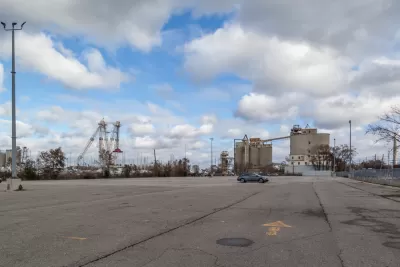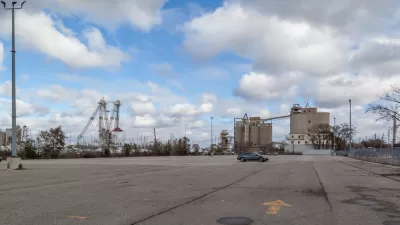After Alphabet-owned Sidewalk Labs dropped the project, Toronto is evaluating other proposals for redeveloping their waterfront.

Four design teams have been shortlisted to redevelop Toronto's Quayside, reports Donovan Vincent, each with their own unique vision for "the future of the empty 12-acre parcel of land that Google sister company Sidewalk Labs abandoned last year." After unveiling an ambitious plan for a 190-acre "tech-driven neighborhood," Sidewalk Labs drastically scaled back the 'smart city' project after encountering public opposition, then ended their involvement altogether in May 2020, citing financial concerns.
The winning team will be selected next year by Waterfront Toronto, and local advocates hope the winning design will "include public connections to the waterfront as well as vibrant spaces for recreation and cultural events," reports Vincent, in addition to condos and commercial spaces.
Vincent details the four teams and their past projects and accomplishments, which include the Smithsonian’s Museum of African American History and Culture, Montreal's New Vic, and Amsterdam’s Silodam housing. An evaluation committee consisting of senior managers with Waterfront Toronto and representatives from the city and CreateTO "will make recommendations to a steering committee, which in turn will make a recommendation to Waterfront Toronto’s board of directors," Vincent writes.
The collapse of the Sidewalk Labs proposal could be a bellwether for 'smart city' projects, which promise to improve the efficiency, transparency, and functionality of cities through data and technology. Some critics see this algorithmic, data-drive approach as incompatible with the glacial pace of civic bureaucracy and the unpredictable nature of human behavior.

Maui's Vacation Rental Debate Turns Ugly
Verbal attacks, misinformation campaigns and fistfights plague a high-stakes debate to convert thousands of vacation rentals into long-term housing.

Planetizen Federal Action Tracker
A weekly monitor of how Trump’s orders and actions are impacting planners and planning in America.

San Francisco Suspends Traffic Calming Amidst Record Deaths
Citing “a challenging fiscal landscape,” the city will cease the program on the heels of 42 traffic deaths, including 24 pedestrians.

Adaptive Reuse Will Create Housing in a Suburban Texas Strip Mall
A developer is reimagining a strip mall property as a mixed-use complex with housing and retail.

Study: Anti-Homelessness Laws Don’t Work
Research shows that punitive measures that criminalized unhoused people don’t help reduce homelessness.

In U.S., Urban Gondolas Face Uphill Battle
Cities in Latin America and Europe have embraced aerial transitways — AKA gondolas — as sustainable, convenient urban transport, especially in tricky geographies. American cities have yet to catch up.
Urban Design for Planners 1: Software Tools
This six-course series explores essential urban design concepts using open source software and equips planners with the tools they need to participate fully in the urban design process.
Planning for Universal Design
Learn the tools for implementing Universal Design in planning regulations.
Heyer Gruel & Associates PA
JM Goldson LLC
Custer County Colorado
City of Camden Redevelopment Agency
City of Astoria
Transportation Research & Education Center (TREC) at Portland State University
Jefferson Parish Government
Camden Redevelopment Agency
City of Claremont




























